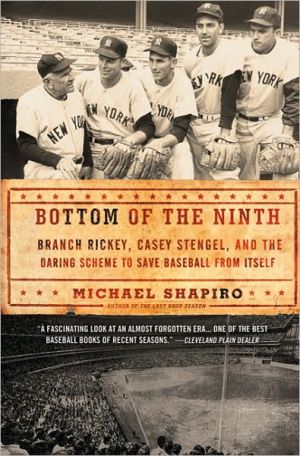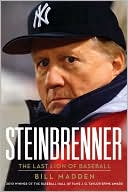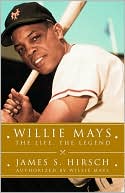Bottom of the Ninth: Branch Rickey, Casey Stengel, and the Daring Scheme to Save Baseball from Itself
"A fascinating look at an almost forgotten era . . . One of the best baseball books of recent seasons." —Cleveland Plain Dealer\ In Bottom of the Ninth, Michael Shapiro brings to life a watershed moment in baseball history, when baseball was under seige in the late 1950s. He reveals how the legendary executive Branch Rickey saw the game's salvation in two radical ideas: the creation of a third major league—the Continental League—and the pooling of television revenues for the benefit of all....
Search in google:
Fifty years ago, as baseball faced crises on and off the field, two larger-than-life figures took center stage, each on a quest to reinvent the national pastime In the late 1950s, baseball was under siege. Up-and-coming cities that wanted teams of their own were being rebuffed by the owners, and in response Congress was threatening to revoke the sport’s antitrust exemption. These problems were magnified by what was happening on the field, as the New York Yankees were winning so often that true competition was vanishing in the American League. In Bottom of the Ninth, Michael Shapiro brings to life this watershed moment in baseball history. He shows how the legendary executive Branch Rickey saw the game’s salvation in two radical ideas: the creation of a third major league—the Continental League—and the pooling of television revenues for the benefit of all. And Shapiro captures the audacity of Casey Stengel, the manager of the Yankees, who believed that he could bend the game to his wishes and remake how baseball was played. Their stories are interwoven with the on-field drama of pennant races and clutch performances, culminating in three classic World Series confrontations. As the tension built on and off the field, Rickey and Stengel would find themselves outsmarted and defeated by the team owners who held true backroom power—defeats that would diminish the game for decades to come. Shapiro’s compelling narrative reaches its stunning climax in the seventh game of the 1960 World Series, when one swing of the bat heralds baseball’s eclipse as America’s number-one sport. The New York Times - Jonathan Eig …elegant and exhaustively researched…It's not easy writing a book about a dream that didn't materialize—especially when the pursuit of that dream centers mostly on business meetings, phone calls, memos and drafts of legislation. It's a testament to Shapiro's sharp eye for detail that he keeps the story zipping along.
\ Jonathan Eig…elegant and exhaustively researched…It's not easy writing a book about a dream that didn't materialize—especially when the pursuit of that dream centers mostly on business meetings, phone calls, memos and drafts of legislation. It's a testament to Shapiro's sharp eye for detail that he keeps the story zipping along.\ —The New York Times\ \ \ \ \ Publishers WeeklyIn 1958, after the Dodgers and Giants had both left New York for California, a group of investors sought to bring the city a new baseball franchise, and their proposal was a bold one. Led by former Dodgers general manager Branch Rickey, they sought to create an entire new major league. Meanwhile, as the advocates for the would-be Continental League tried to make their case before the existing major league owners, New York Yankees manager Casey Stengel struggled to keep America's most popular team in championship form. Shapiro (The Last Good Season) parallels these two stories, arguing that they represent a hinge point when team owners could have taken radical steps to reclaim the sport's hold on the public imagination, but chose instead to cling tightly to their near-monopoly, paving the way for other sports, like football, to rise in popularity. The history, filled with colorful personalities, is told in a straightforward manner. While its two halves don't always fit together neatly, they offer a lively perspective on backstage dealings that almost changed the course of professional sports in America. 8 pages of b&w photos not seen by PW. (June)\ Copyright © Reed Business Information, a division of Reed Elsevier Inc. All rights reserved.\ \ \ Library JournalShapiro (Columbia Sch. of Journalism; The Last Good Season: Brooklyn, the Dodgers, and Their Final Pennant Race Together) artfully tells a story of backroom ambitions ultimately defeated by the front offices of the MLB. After the 1958 series, William Shea, Branch Rickey, and Casey Stengel announced their plan to build a third major league, the Continental League; it was fated never to field a team. Shapiro ties the arc of his story to the decline of baseball as America's favorite sport. As much a business history as a baseball story; recommended on both counts.\ \ —Margaret Heilbrun, Gilles Renaud\ \ \ \ \ Kirkus ReviewsParallel tales of two of baseball's greatest lions in the winters of their careers. By the late 1950s, writes Shapiro (Journalism/Columbia Univ.; The Last Good Season: Brooklyn, the Dodgers, and Their Final Pennant Race Together, 2003, etc.), baseball, though still popular, was in trouble. Attendance had fallen precipitously since the '40s, and the game was being supplanted by football as America's favorite professional sport. Enter veteran baseball executive Branch Rickey, who at age 74 attempted to save baseball by creating a third major league, the Continental League. This new league, envisioned Rickey, would be free of the self-interested and self-destructive myopia of the current major-league owners and would share resources, prospective players and the ever more lucrative revenue from television. In short, the new league would be competitive, which the previous leagues were not. The impetus was the New York Yankees and their wizened manager Casey Stengel, who had made an art of mangling the English language while proving to be a master baseball tactician. Under Stengel, the Yankees had won seven World Series, with consistently dominating performances that made baseball boring. With the "reserve clause" in place, in which players were tied to a team for life, not much promised to change. While Rickey pushed for such change, Stengel, approaching 70, was under pressure to continue the Yankees' winning ways. Both men, each nursing an oversized ego, believed they would succeed because they willed it; in 1960, both men failed. Rickey would find the likely owners for the new league franchises no more open to innovation than the established league owners, and the Continental League woulddie with the expansion of the National and American Leagues. To save his job, Stengel had to win the 1960 World Series; he did not and was promptly fired. Eventually Rickey and Stengel, both of whom loved the limelight, faded from public awareness. Shapiro expertly enlivens these two larger-than-life characters and captures in fine detail an important era in baseball history. A well-crafted story that will appeal most strongly to baseball aficionados.\ \








